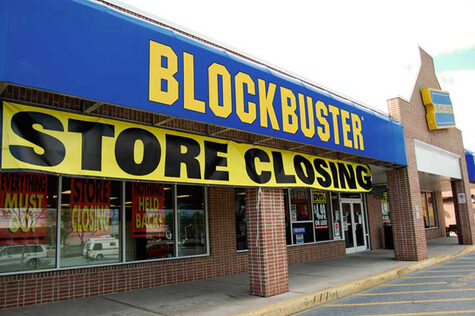
Blockbuster will soon be dead. If it isn't already.
By early January, Dish Network, parent company to the sad remnants of the once-ubiquitous video rental chain that long-ago made it OK for adults to stay home on weekend nights, is closing its remaining 300 stores. Blockbuster shuttered its Toledo locations last year.
Dish Network, a Pay-TV satellite service, is also dropping Blockbuster's DVD-by-mail business.
The Blockbuster brand will be kept alive — barely — through a streaming service available to Dish customers for an extra fee and an on-demand streaming service for the general public.
Experts will say the death of Blockbuster as we knew it is proof the end of physical media is nigh.
DVDs and Blu-rays and CDs are yesterday's technology. Online movies, games, and music are the present and future — until something better and shinier comes along.
Funny enough, technology gurus forecast a similar extinction for the vinyl LP after the arrival of the CD in the mid-1980s.
But by the mid-way point of this year, Vinyl LP sales were up 33.5 percent from last year, according to Nielsen SoundScan, while CD sales declined more than 14 percent. Yes, CDs still outsell vinyl records by many millions, but there's no denying the nearly decade-long resurgence of a left-for-dead format. What's driving these gains isn't nostalgia, but music enthusiasts who contend that vinyl provides a warm and fuller sound that digital music (CD and MP3s) can't match.
The take-away lesson should be that there's no such thing as a dead format for consumers. (Except for 8-track tapes. Nobody likes those.) But it's not true.
Sony's Minidisc. LaserDiscs. HD-DVD. These are dead formats that will never be resurrected. Ever.
Such is the way of consumer electronics, as newer, better, and cheaper devices, formats, technologies rise up and render obsolete anything that can't keep up. Fast and brutal, the march of technology is Darwin's theory of evolution on speed, only the strong — i.e., better — don't always survive.
The Betamax was superior to the VHS, but consumers didn't care. Some argued that the Digital Audio Tape offered a better sound than the CD, but how many home systems did you ever see with a DAT player?
For Sunday The Blade is running an Arts cover story of mine exploring the history and legacy of the Atari 2600 and Intellivision console war of the early 1980s. The 2600 was the older system and, when compared to the more-advanced and more-powerful Intellivision, offered rather primitive graphics and simplistic gameplay. Again, it didn't matter, as the 2600 ultimately sold millions and millions more units than its bigger and better rival.
Yet in a strange twist, these systems weren't killed off by newer home consoles, but by the video game industry crash of 1983-84. Think of it as the giant asteroid wiping out the dinosaurs all over again.
Market forces, much like the forces of nature, work in mysterious ways.
As for Blockbuster, its end wasn't so quick and decisive, but slow and painful to watch. The rental chain fell prey to the convenience of online technologies and consumer preference to not to drive to a store to check out and return movies. The sentiment is that disc-based movies, music, and games aren't far behind either.
That's supposed to be the way of technology. Those who've bought a vinyl record in the last five years, though, may suggest otherwise.
Read more at http://www.toledoblade.com/KirkBaird/2013/11/08/Sounding-Blockbuster-s-death-knell.html#ARfJdHDiCvVBo3i3.99
